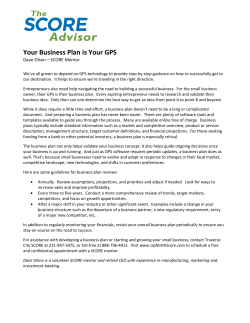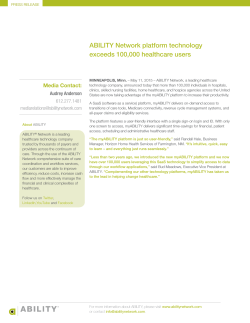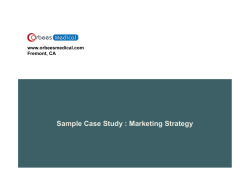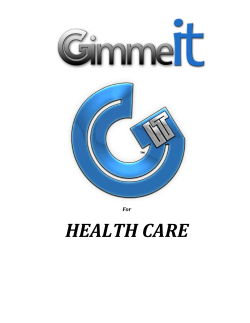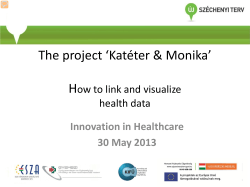
HEALTHCARE CONFIDENCE INDEX
1 HEALTHCARE CONFIDENCE INDEX Insight from primary healthcare professionals March 2015 2 WHAT’S IN THIS REPORT OUR CONTRIBUTORS Ian Crompton Head of Healthcare Banking Services, Lloyds Bank Commercial Banking Bob Senior Head of Medical Services, Baker Tilly Dr Arvind Madan GP and CEO of Hurley Group Hiten Rawal CEO of Wellbrooke Products Limited Kevin Nichols Managing Director, The Pharmacy Consultancy Graham Rew Specialist Dental Accountant at Hazlewoods Jas Matharoo Director, Nice Teeth Limited Adam Thompson Director, Primary Care Surveyors Lynne Abbess Partner, Hempsons WHAT’S IN THIS REPORT 3 4 6 8 10 FOREWORD IAN CROMPTON METHODOLOGY AND OVERALL RESULTS GP RESULTS BOB SENIOR DR ARVIND MADAN PHARMACIST RESULTS HITEN RAWAL KEVIN NICHOLS DENTIST RESULTS GRAHAM REW JAS MATHAROO 12 INTRODUCING NEW COSMETIC DENTAL CHOICES TO THE LOCAL COMMUNITY 13 BENEFITS OF INTEGRATED HEALTHCARE SERVICES UNDER ONE ROOF 14 FUTURE PLANNING ADAM THOMPSON 15 CLOSING THOUGHTS LYNNE ABBESS 3 FOREWORD FOREWORD Ian Crompton Head of Healthcare Banking Services, Lloyds Bank Commercial Banking Welcome to the Spring 2015 edition of the Lloyds Bank Commercial Banking Healthcare Confidence Index, the sixth wave of research based on primary healthcare providers’ outlook for their businesses. The latest wave of the Lloyds Bank Commercial Banking Healthcare Confidence Index has indicated a rise in confidence across all three sectors, likely mirroring more confidence in the general economy. The sector, by and large, hasn’t been through any new or unexpected turbulence in the last 12 months, and things certainly seem to be on an upward trend. GPs remain more pessimistic than their counterparts, with perhaps a sense of resignation amongst some reflecting the fact that 41 per cent are planning to either retire or leave the sector within the next ten years. On a more positive note there is a marked increase in the number of GPs intending to bid for additional services. Nearly two thirds are now looking to get involved either independently or as part of a federation, compared with only 37 per cent in the last survey. Interestingly, 59 per cent of GPs would still recommend their profession to friends or family. Pharmacists remain the most optimistic group in the longer term with 69 per cent looking to grow their business, whilst 39 per cent of pharmacists are planning to acquire additional units, a significant increase from the quarter of respondents we saw in the last survey. Pharmacists are also the most bullish around bidding for new contracts with 80 per cent keen to either start bidding (22%) or take on more than they already hold (58%). Dentists too are more optimistic, reflected in the 78 per cent that are planning to expand, whether at their current site, or by branching out into more locations. There remains a lack of confidence that the long anticipated new NHS contract will be adequately funded and there is the expectation that private dentistry will in the near future become the more profitable of the two options. On the whole, this is an encouraging report that indicates a brighter outlook for the sector, and the following pages provide deeper insight from our individual sector specialists. 59% of GPs would recommend their profession to friends or family. 4 METHODOLOGY AND OVERALL RESULTS METHODOLOGY AND OVERALL RESULTS A blended figure of both the short-term and long-term projections is used to provide a measure of overall business confidence within the primary healthcare sector. As in our previous indexes, we have sought to gain responses from three primary healthcare professions: GPs, dentists and pharmacists. The responses for each profession are given equal weighting within the overall index figure. This is a dispersement index, so any figure greater than zero represents a positive outlook. The maximum value achievable is +100 and the minimum result is -100. This wave of the survey has continued a trend that has seen the long-term combined figure rise to -63 from -65 in the previous survey. This marks an 11 point improvement from the 2012 figure, which stood at -74, suggesting the outlook is slowly improving across the primary healthcare sectors. In the short-term, the confidence of dentists has almost doubled, now standing at 43 compared to 23 in the previous wave. The outlook of pharmacists has also shown promising progress, rising to 23 from 18. GPs remain the only profession to show a negative outlook, albeit with an 11 point improvement, rising from -34 to -23. This is a record high result for GPs since the survey was launched in 2011. Key SHORT-TERM HEALTHCARE CONFIDENCE 60 40 20 0 -20 -40 -60 -80 Wave 1 Autumn 2011 Wave 4 Spring 2013 Wave 5 Spring 2014 Wave 6 Spring 2015 40 20 0 -20 -40 -60 -80 -100 Wave 1 Autumn 2011 Pharmacist Combined Wave 3 Autumn 2012 LONG-TERM HEALTHCARE CONFIDENCE GP Dentist Wave 2 Spring 2012 Wave 2 Spring 2012 Wave 3 Autumn 2012 Wave 4 Spring 2013 Wave 5 Spring 2014 Wave 6 Spring 2015 COMBINED HEALTHCARE CONFIDENCE 40 20 0 -20 -40 -60 -80 -100 Wave 1 Autumn 2011 Wave 2 Spring 2012 Wave 3 Autumn 2012 Wave 4 Spring 2013 Wave 5 Spring 2014 Wave 6 Spring 2015 5 METHODOLOGY AND RESULTS 22% Nearly a quarter of GPs are planning to retire or leave the profession in the next five years. 80% Four fifths of pharmacists intend to bid to win new services. 62% Nearly two thirds of dentists do not expect NHS dentists to be more profitable than Private in five years’ time. 6 GP RESULTS GP RESULTS BOB SENIOR Head of Medical Services, Baker Tilly I’m quite surprised by the rise in short-term confidence among GPs, which seems to go against the general mood of those within the profession that I encounter on a day-to-day basis. From my perspective, finances within the sector are continuing to tighten, and potential Government reforms of the NHS mean that the future for the industry remains largely uncertain. Digging deeper into the survey seems to reflect this view, with 91 per cent of respondents putting forward the view that financial pressures are set to increase, whilst just one per cent believe that the situation will improve. One of the biggest changes on the agenda is the idea that practices may have to increase opening hours and provide services seven days a week. The potential impact of this could render it difficult to recruit GPs to offer these extended services, while young doctors may be swayed into going to work abroad as a means of avoiding the perceived ‘red tape’ of working in a British practice. This leads to a likelihood that practices will have to work together far more to mitigate the impact of potential changes, and to maintain profitability. Increased integration has to happen as, from 2020, practices will be remunerated based on their patient numbers. While this may not cause a big problem for practices that serve a large population, practices in smaller towns and villages may suffer as the money they receive will be scaled down. Again, it comes down to doctors continuing to work against a backdrop of costs being driven down, whilst trying to maintain a comprehensive local service. Stemming patient demand remains the biggest issue faced by GPs, and until a solution is found which allows this to happen without unduly impacting on profitability, it is difficult to forecast any significant rise in confidence. GPS’ CONFIDENCE INDEX 91% of GPs expect the financial pressures of their practice to increase over the next five years. QUESTION ONE What are your current plans for bidding to win/retain additional services? Short-term Long-term Combined 0 Bidding as a single practice -10 -20 14% No plans to bid -30 39% -40 28% Bidding as part of a federation -50 18% -60 Both of the above -70 -80 -90 Wave 1 Autumn 2011 Wave 2 Spring 2012 Wave 3 Autumn 2012 Wave 4 Spring 2013 Wave 5 Spring 2014 Wave 6 Spring 2015 7 DR ARVIND MADAN GP and CEO of Hurley Group While this report has shown an upturn in short-term confidence among GPs, it also points to continued concern in the long-term. This short-term optimism may be related to a number of factors, such as a new CEO at the helm, the new GP contract, or a sense of change coming because others begin to recognise our integral role within the NHS. The RCGP and BMA are also becoming more effective at influencing the power brokers, whilst it could be that more and more GPs are beginning to work together in federations to try and alleviate the isolation that many within the profession have felt in recent years. We are also in a General Election year, with many of the main parties highlighting increased healthcare spending as a key pillar of their manifestos. Even the media is criticising GPs a little less than usual, perhaps as they realise that the rising numbers we are seeing in general practice eclipse those that have long been publicised in urgent care. However, despite the upturn in short-term confidence, looking further ahead there remains a significant level of concern. We remain grounded by the vision of spiralling patient expectations, greater complexity, stricter regulation, financial pressures and a looming recruitment crisis. Going forward, there is an acknowledgement that increased use of skill mix, technology and integration of services is necessary, as well as a change in the way services are commissioned. With the five year Forward View, we will trend towards a capitated year of care model, with risk and reward shared across sectors. This will hopefully move the system to appreciate the role of the expert generalists more. We may also see the start of experimental accountable care organisations with GP groups employing specialists or hospitals taking over practices, which could result in a more permissive environment of local services configuration through co-commissioning. On the whole, while GPs are receptive to positive changes, we know we stand at a crossroads. We cannot continue doing it the way we have always done it, but we don’t quite know what to do next either. GP RESULTS QUESTION TWO Do you consider the reforms underway in primary care as a threat or opportunity for your business? No impact 7% A small opportunity 29% A major threat 30% 6% A major opportunity 29% A small threat QUESTION THREE What describes your personal plans for the next five years? QUESTION FOUR In five years’ time what percentage of your practice’s income do you expect to be from services subject to a tendering/bidding process? Partner and happy to stay as I am Retiring / leaving Looking for a partner position None 21-30% 17% 22% Over 30% 9% 13% 15% 29% 17% Salaried GP/ Locum and happy to stay that way 28% Partner and want to grow the practice 11-20% 23% 27% 1-10% 8 PHARMACIST RESULTS PHARMACIST RESULTS HITEN RAWAL CEO of Wellbrooke Products Limited It’s good to see that the confidence of pharmacists appears to be increasing once again, and with the sector likely to remain steady for the coming year, I am hopeful that this will continue into the next survey period. The main development for pharmacists sees a change in reimbursement, with an extra 12p to be provided per item dispensed, and a reduction in the practice payment. With most pharmacies having a settled customer base, and therefore a fairly static number of prescriptions, this change means that the acquirement of new units is set to be the most effective way of growing both volume and profits. However, it could also present certain challenges to those serving communities in low-population villages and towns, who will be pressured into providing the vital service with potentially a reduced income. On the whole, the reaction to reform is mixed, with 46 per cent of respondents seeing it as a positive opportunity, while 44 per cent view it as a threat. It would seem that while optimism is rising, pharmacists are reserving some degree of caution as to the exact nature of the sector’s future. Going forward, integrated services will shape the future of healthcare, with the onus on pharmacies to offer a greater provision of primary care services. This is helping to drive the growth plans of pharmacists although, for many, there is still a question mark over exactly what model they are going to grow into. While it’s positive to see rises in confidence across the board, there remain certain challenges ahead, with many questions remaining unanswered when it comes to the future of the health industry. It’s no surprise to see that the confidence of pharmacists and dentists is higher than that of their GP counterparts, although this can be explained in part by the fact that they both have their contracts tied down for the immediate future, whereas GP practices are yet to learn of any changes which may be on the horizon. Of course, since this survey was carried out, the Government has announced plans to commit extra funding of up to £2billion within the healthcare sector, and this could provide a further boost as we look ahead to the next wave of the survey. PHARMACISTS’ CONFIDENCE INDEX Short-term 46% of pharmacists view the reforms in primary care as a positive opportunity for their business. QUESTION ONE What are your current plans for bidding to win/retain services? Long-term Combined 0 -10 Have contracts but don’t want more Don’t want to take on additional services -20 8% 9% -30 Don’t have contracts but intend to bid soon -40 12% 22% -50 58% -60 Have contracts and want more -70 -80 -90 Wave 1 Autumn 2011 Wave 2 Spring 2012 Wave 3 Autumn 2012 Wave 4 Spring 2013 Wave 5 Spring 2014 Wave 6 Spring 2015 9 KEVIN NICHOLS Managing Director, The Pharmacy Consultancy Pharmacy is on the up in terms of both short and long-term confidence, and this can be attributed to robust prices within the sector, together with a new settlement for pharmacy contracts which mean that ‘claw back’ by the Government isn’t as onerous as it has been previously. Amid this positive outlook, the sector needs to be aware of the importance of providing more services, in-line with the growing need to increase their offering beyond their traditional role of dispensing medicines. With strains on GPs’ surgeries on the increase, it is inevitable that there will be an increasing need for pharmacies to step up and take responsibility for certain primary healthcare services, which patients may in the past have been offered by doctors. As this issue comes increasingly to the fore, pharmacists must consider the need to engage with all service commissioners, local authorities and procurement partnerships, to ensure they are offering the correct breadth of services. It is important to tailor these offerings to the needs of the local community, which the pharmacy serves. For example, if obesity is a problem, the community would benefit from a weight management service, whilst smoking cessation provision could be more suitable in other areas. One of the main differences between this wave of the survey and the results we saw last year is that the number of pharmacists looking to expand through the acquirement of additional units has increased by 14 per cent to 39 per cent. This can be partly explained by the settled nature of the pharmacy contract, following the removal of most exempt contracts. This adds certainty to the financial planning process for the entrepreneurial pharmacist and acquiring additional pharmacies is an effective way of growing the business. Therefore, access to bank funding becomes an even more important part of this process. I feel that this level of optimism should be maintained going into the next survey period, with the industry now settled for the coming 12 months at least. The only potential caveat to that is the possibility of a new Government in May, which could alter the landscape for healthcare generally, including pharmacists, in, as yet, undetermined ways. PHARMACIST RESULTS QUESTION TWO Do you consider the reforms underway in primary care as a threat or an opportunity for your business? No impact 11% A small opportunity 30% A major threat 20% 16% 24% A major opportunity A small threat QUESTION THREE Which of the following statements is closest to your current plans for the next five years? No plans / not thought about it Carry on as I am Retire / Get out 7% QUESTION FOUR In five years, do you expect the ratio of your NHS turnover (excl. wholesaling and OTC) between Services and PPD income to: Remain the same 4% 11% Increase significantly 13% 25% Reduce slightly 17% Grow – buy additional units 39% 39% Grow the businesss where I am 4% Reduce significantly 41% Increase slightly 10 DENTIST RESULTS DENTIST RESULTS GRAHAM REW Specialist Dental Accountant at Hazlewoods The results from this survey show a clear trend for strong confidence within the healthcare sector, and this largely mirrors the improvements which we have seen within the general UK economy. With falling unemployment, together with predictions of three per cent growth, the UK currently ranks as having one of the fastest growing major economies in the world, and this is fostering a more optimistic outlook and a greater buoyancy within the healthcare sector. Dentists in particular have seen an improvement in the profitability of practices over the past 12 months, and it is pleasing to see that the majority of practice owners are expecting to see this continue for the foreseeable future. However, this good news is tempered somewhat by the fact that, despite being profitable at present, the majority of dentists expect to see financial pressures increase over the next five years. For those looking to grow, the survey shows that the majority of dentists are looking to expand their business by making changes to their existing practices, but there remains a number of entrepreneurial practice owners who are looking to acquire further units. Therefore, demand for practices is expected to remain high, and simple economics would suggest that the high goodwill values that we are seeing at the moment will potentially remain in place for the future. Looking at the wider picture, it’s clear that uncertainty surrounding the NHS continues. The new contract is yet to arrive, and while pilot schemes have been completed, there are now promises of further prototypes which will prolong this feeling of unease among many dentists. This, inevitably, can lead to a lack of confidence that the contract will be adequately funded, and I believe we can expect mixed and NHS practices to boost their revenues by providing further private treatments, capitalising on an increased public appetite for spending. DENTISTS’ CONFIDENCE INDEX 64% of dentists expect their business profits to increase in the next 12 months. QUESTION ONE Which of the following statements is closest to your current plans for the next five years? Short-term Long-term Combined 50 No plans / not thought about it 40 Carry on as I am Retire / get out 30 20 5% 9% 10% Grow – buy additional units 10 17% 20% 0 -10 49% -20 -40 Grow the business where I am -50 -60 -70 -80 Wave 1 Autumn 2011 Wave 2 Spring 2012 Wave 3 Autumn 2012 Wave 4 Spring 2013 Wave 5 Spring 2014 Wave 6 Spring 2015 11 JAS MATHAROO Director, Nice Teeth Limited This is the sixth successive survey that has indicated that dentistry is the most optimistic sector, demonstrated by an apparent keen appetite for growth throughout the profession. The results of the Index show that almost half of those surveyed are looking to grow their business at its current site, with a further 20 per cent looking to expand through the acquirement of additional units. This degree of entrepreneurialism throughout the profession is indicative of the burgeoning economic recovery, and the fact that dentistry is a sector that can benefit from commercial spending more than others within the primary care space. Therefore, it’s little surprise to see a greater appetite to take on private work as opposed to NHS led contracts. More than a quarter of those surveyed have already gone private, with an equal number happy to offer a mix of private and NHS treatments, and a further 29 per cent of those offering a mixed service with the intention of increasing their private provision. Of the 16 per cent of respondents who offer only NHS services, three quarters are looking to introduce private treatments within their surgeries, further indicating the increased trend to offer these services. The thinking behind these results becomes a little clearer when you consider that 79 per cent of dentists have expressed their doubts that the proposed new NHS contract for dentists will be adequately funded. On the whole, though, this is another promising set of results, indicating a certain bullishness among dentists to maximise their profitability amid an improving financial climate, and I would expect this optimism to continue to grow over the coming survey period. DENTIST RESULTS QUESTION TWO On the NHS v Private issue, which best describes your current status and thinking? No plans/not thought about it NHS but want more Private 3% Already fully Private 12% NHS and plan to stay as I am 26% 4% 29% 26% Mixed but want more Private Mixed and plan to stay as I am QUESTION THREE Even if you have a Private Practice how confident are you that the proposed new NHS dental contract will be adequately funded? Very confident Not at all confident QUESTION FOUR The latest statistics show NHS dentists are more profitable than Private; do you expect this to be the case in five years’ time? Fairly confident 3% 12% 18% 32% Definitely Definitely not 8% 30% 50% 47% Probably not Not very confident Probably 12 INTRODUCING NEW COSMETIC DENTAL CHOICES TO THE LOCAL COMMUNITY INTRODUCING NEW COSMETIC DENTAL CHOICES TO THE LOCAL COMMUNITY 7,000 Cwmbran Dental Spa now serves 7,000 patients in Croesyceiliog, offering cosmetic treatments such as teeth whitening. Dr Sharlene Parmar-Anwar bought the practice in 2012 with help from Lloyds Bank, six years after she graduated from Cardiff University Dental School. Two years on, Cwmbran Dental Spa now serves 7,000 patients – an increase of 10 per cent since she took over. To build on this success, Sharlene secured a further six-figure loan from the bank, which enabled her to add new cosmetic services, such as teeth whitening, to meet rising client demand. She also used the funding to refurbish the clinic, enabling patients to receive treatment in a bright and modern practice. The dental surgery is now serving a larger proportion of the local area, easing the pressure on other local health services, and the investment has created further employment opportunities and increased the clinic’s capacity for treatments. Sharlene said: “The refurbishment means that we are now in a better position to provide services for the local community and have the best modern facilities in place to ensure patients receive quality care in an inviting and relaxing space. “The funding and support we received from Lloyds Bank was vital to make our refurbishment and treatment plans a reality, and the bank’s specialist team of healthcare relationship managers played a fundamental role throughout the whole process.” Suzanne Rees, Relationship Manager at Lloyds Bank Commercial Banking, said: “As is reflected in the latest Index findings, we’ve seen that confidence amongst dentists in the long-term remains steady, whilst in the short-term it is soaring. “The refurbishment of Cwmbran Dental Spa and the investment in new services is evidence that dentists are continually looking for new ways to enhance their offering for patients, making long-term investments to ensure a positive and successful future. The practice can now serve the ever growing demand for new treatments and is an asset to the local community.” 13 BENEFITS OF INTEGRATED HEALTHCARE SERVICES UNDER ONE ROOF BENEFITS OF INTEGRATED HEALTHCARE SERVICES UNDER ONE ROOF Heswall Medical Centre and Pensby Surgery in Wirral merged and relocated to form Heswall and Pensby Group Practice, with the support of a seven figure loan from Lloyds Bank Commercial Banking. After securing the funding package from Lloyds Bank to join under one roof at a newly renovated site, Heswall Medical Centre and Pensby Surgery now operate as Heswall and Pensby Group Practice, and offer a wider range of services for over 12,400 patients. The practice operates from a purpose-built building with a specialist minor operations room and dedicated areas for visiting physiotherapists and counsellors to work from. Recognising the changing landscape of the healthcare sector, the partners of the former Heswall Medical Centre and Pensby Surgery saw an opportunity to expand the services on offer to patients by joining together to facilitate all healthcare amenities from one full-service medical centre. Dr Sophia Nelson was instrumental in the practice merger. She said: “We had been hoping to modernise the centre for over fifteen years, so to eventually see the new premises completed was a very proud moment for everyone involved. The new centre has the capacity to offer a wider range of care options, as well as providing room to keep expanding over the next few years as our patient list size increases further.” She added: “The support we received from Lloyds Bank was instrumental to the project’s success. The bank immediately understood what we were trying to achieve, and they were always on hand to provide pragmatic and honest guidance at every stage of the development.” Graham Scott, Senior Healthcare Banking Consultant at Lloyds Bank Commercial Banking, said: “When the partners approached us with the plans we could immediately see how the expansion would benefit patients and the wider community. Combining the two surgeries in one state-of-the-art centre meant that patients would have access to a wider range of services in a modern and spacious environment. “In line with the latest Index findings, which show that GP practices are planning to grow, Heswall and Pensby Group Practice is a great example of a local business that has been formed by two practices looking to capitalise on growth opportunities and provide a better service for the local community. “Our specialist Healthcare Banking teams receive regular training to ensure that they can help GP businesses achieve their growth ambitions and are always on hand to provide tailored support and advice to help them achieve their goals.” The merger enabled the practice to operate from a purpose-built building with a specialist minor operations room and dedicated areas for visiting physiotherapists and counsellors to work from. 14 FUTURE PLANNING FUTURE PLANNING Adam Thompson Director, Primary Care Surveyors While GPs’ short-term confidence reflects that they remain not overly optimistic, it is a significant improvement on the pessimism we’ve seen in the last couple of years. This can perhaps be explained by a changing public attitude to primary healthcare, driven by a more sympathetic media narrative. Notably, the Royal College of General Practitioners has raised the profile of the important role GPs play in the sector, and have brought many of the issues surrounding it into the public conscience. The extra £2billion of funding announced by the Government following the completion of this survey period may have an effect on the short-term confidence in coming months, although it is tempered by a belief among some that this may be a ‘sticking plaster’ solution that does not address the longer-term concerns about the infrastructure of the sector. Going forward, the main challenges faced by GPs will revolve around resource issues and cost, with increased integration of services a necessity. I believe that there may be more ‘filtering’ down of points of access to medical services, with more primary care to be delivered by pharmacists, and GPs increasingly being able to specialise to ease some of the pressure on secondary care and make quality care more accessible. This will allow hospitals to become ‘centres of excellence’, dedicated to what are deemed the more complex and essential life-saving services. These changes will mean that rather than visiting their GP for any condition, patients will instead come to a medical centre that accommodates a range of healthcare services and see the appropriate professional – whether it’s a GP, a pharmacist, a nurse, or another type of specialist. One of the most interesting findings in this survey is a slight inconsistency between those who expect the NHS to improve, with 43 per cent responding positively, and an identical number with the opposing view. This could potentially be explained by a feeling that despite improvements in cancer detection and treatment successes, this could be caused by a narrowing focus away from non-life threatening conditions. While it would appear that almost 60 per cent of GPs expect to remain in the profession in ten years’ time, what isn’t specified is whether they believe this will be within the NHS. Until we have greater clarity on future strategy, this will be the main question going forward. 59% 39% Nearly three fifths of GPs consider the reforms underway in primary care as a threat to their business. Over a third of GPs have no plans to bid for additional services. 15 CLOSING THOUGHTS CLOSING THOUGHTS Lynne Abbess Partner, Hempsons There has been a key shift in the last survey period which has coincided with a greater understanding of the pressures GPs face, with even the press, who have long been critical of the industry, beginning to come onside. This greater level of appreciation means that doctors are not feeling as isolated as they perhaps were previously, which has helped to achieve the rise in short-term optimism indicated by respondents. Looking ahead to the coming 12 months, the £2billion funding boost announced recently by the Government may see confidence among GPs continue to rise, although this will largely depend on the conditions it will carry. The BMA is lobbying for £1.2billion to be earmarked for improvements to the real estate infrastructure, with the aim of offering updated facilities for the benefit of GPs, their staff and patients. However at the same time, there are concerns about the high levels of service charges carried by large modern facilities, which could impact on the benefits perceived through the opportunity to work within them – potentially to the extent these are perceived to outweigh the benefits of any extra funding practices will receive, so it will be important to exercise caution in the short term. 72% Nearly three quarters of all GPs, dentists and pharmacists are happy in their profession. With the NHS a hot topic of debate, it remains to be seen what the future holds for GPs, with the possibility of seven-day week care looming large. There are some practices who may see this proposal as an opportunity which they can make profitable. However, there remains some concern that it could be made mandatory, leaving some surgeries struggling to recruit the doctors and nurses needed to provide this service. Moving on, the confidence of dentists remains high in the short-term, but low in the long-term. This could partially be explained by the proposed increase in registration fees, which are currently being challenged through judicial review, the result of which is expected in the near future. However, with the worst of the recession now hopefully past, the sector is looking ahead to a more profitable future. Finally, it’s good to see confidence rising so well among pharmacists, who are enjoying the opportunities that are coming their way as they play an increasingly important role in adding primary healthcare services to their traditional role of dispensing medicine. The evidence that pharmacists are beginning to form federations to bid for contracts reflects the fact they are stronger, and feeling optimistic, and this is reflected in the report. 69% More than two thirds of dentists want to grow their business over the next five years. 16 For more information Go to lloydsbank.com/healthcare Call us on 07802 750707 Email Ian.Crompton@Lloydsbanking.com Please contact us if you’d like this information in an alternative format such as Braille, large print or audio. If you have a hearing or speech impairment you can use Text Relay (previously Typetalk) or if you would prefer to use a Textphone, please feel free to call us on 0345 601 6909 (lines open 7am-8pm, Monday-Friday and 9am-2pm Saturday) Important information. Our service promise. Please note that any data sent via e-mail is not secure and could be read by others. Lloyds Bank plc Registered Office: 25 Gresham Street, London EC2V 7HN. Registered in England and Wales no. 2065. Telephone: 020 7626 1500. Authorised by the Prudential Regulation Authority and regulated by the Financial Conduct Authority and the Prudential Regulation Authority under Registration Number 119278. Lloyds Bank plc is covered by the Financial Services Compensation Scheme and the Financial Ombudsman Service. (Please note that due to the schemes’ eligibility criteria not all Lloyds Bank business customers will be covered by these schemes.) We subscribe to The Lending Code; copies of the Code can be obtained from www.lendingstandardsboard.org.uk If you experience a problem, we will always try to resolve it as quickly as possible. Please bring it to the attention of any member of staff. Our complaints procedures are published at lloydsbank.com/business/contactus Issue date: March 2015 LBHealthcareEdn6(0315)
© Copyright 2025


